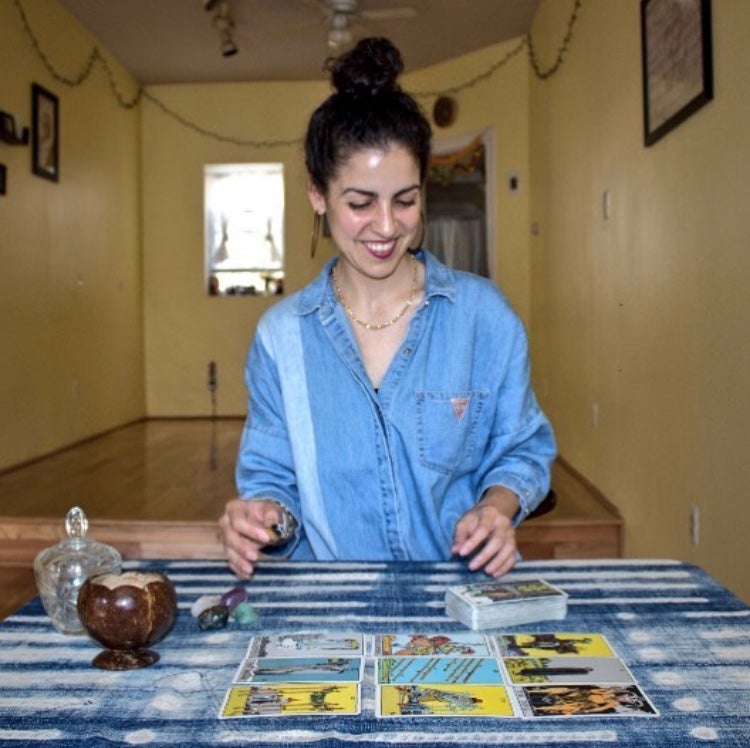
There are many ways to read tarot cards. Cartomancy refers to "reading with the card". This is the first method. A tarot card reader will ask a question, then draw the cards to interpret it. This is how psychics and astrologers gain insight.
There are many ways to read tarot card cards.
There are many ways to read tarot cards, and each method has its own benefits. The best way to approach tarot cards is to be open-minded and avoid biases. To assist with interpretation, you may also want to consult a guide. As you begin to develop your own reading style, you will start to notice patterns in the card meanings and identify common stories within each major and minor arcana.

The first way to read tarot cards is to shuffle the deck and turn them over so that the right side is up. You can also use a spread, which is a combination of different cards to tell a story. You will get more depth reading the more cards are you combine. This method is not for everyone.
Major arcana
Many people interpret the Major Arcana in different ways when they read tarot card cards. Some readers decide to not order the cards, while others choose to set an intention about each card's meaning. Some readers also take into consideration where the Major Arcana cards are placed. For example, a Fool placed within the future actions area might signal a need for changes.
Major Arcana card often reflect lessons or themes from life. They can also offer insight into karmic influences. They are vital and can have a lasting impact on one's entire life. The Major Arcana card meanings are complex and profound. They are the key to many lessons and represent the structure of our consciousness.
Reversals
You may have noticed that reading tarot decks can often result in reversals. This strange phenomenon can leave you wondering if you are correctly reading the tarot. Luckily, there are several ways to interpret reversals correctly.

You can interpret reversals accurately by thinking of them as the reverse of the upright position. Reversals can indicate either an active state or an energetic activity. This can help to determine the meaning of a particular card.
FAQ
Why do we need hobbies
Hobbies can be a part of your life because they provide you with time to unwind, recharge, think creatively as well as the chance to exercise, socialize, and relax. You can also learn new skills and develop lifelong interests.
Hobbies give us meaning and purpose in life.
These can often be a great way to get some extra time while you have nothing else.
They are fun!
You probably don’t have enough time to pursue hobbies.
Take a look at the many options that are available to you. If you don't have a hobby yet, then maybe you should start one today!
How do I find a hobby to pursue?
You might feel as though you don't have a choice when you first start your quest for a hobby.
You might think, "I'm not very talented," "I struggle at sports," "I don't really know anything."
However, it is likely that you already have a lot to draw on when searching for a hobby.
It's just that you haven't realized it yet.
Have a look at your home. How much stuff are you able to store?
Do you have any old toys lying around that could be used?
Perhaps you own a collection or magazines.
You might have always wanted the ability to cook.
Perhaps you would like to play guitar again.
Whatever your hobby, it's possible to make it a hobby.
The secret is to remember that you already have plenty to draw on.
Once you do that, you can choose a hobby to fit your life.
What's a hobby?
Hobby for children is anything they enjoy doing outside of work. Children might be drawn to, build, paint, create stories, play with toys or watch TV.
Many parents are concerned that their children may get into trouble if allowed to do as they please. However, this is not always true. If your child is safe and doesn't cause harm to themselves or anyone else, they won't get into trouble.
It's important to remember that just because they like to do something doesn't mean that they'll always choose to do it. For example, if they love drawing pictures but they hate writing, then they may decide to draw pictures instead of writing.
There are many different hobbies, so it is up to you which one you love the most.
What are good hobby ideas?
The best hobbies are those that you enjoy doing for yourself. You will find it easier to stay motivated if you love what your doing. If you don't feel well or tired, you will always have an excuse!
We all have hobbies that we love and know. These include painting, crafting, photography, cooking and sports.
Volunteering could be a great option.
Perhaps you want something more adventurous. Why not take up scuba diving, rock climbing, sky diving, bungee jumping, white water rafting, sailing, surfing, canoeing, kayaking, horse riding, zip lining, hang gliding, paragliding, skydiving, snowboarding, skiing, mountain biking, hiking, camping, fishing, hunting, archery, shooting, clay pigeon shooting, target shooting, golf, tennis, swimming, snorkeling, windsurfing, waterskiing, kitesurfing, wakeboarding, standup paddle boarding, hang gliding, parasailing, hot air ballooning, paragliding and many more.
You can spend your time outdoors in many different ways, including spelunking, snowshoe hiking, snowshoe hiking and more. These include caving and cave tubing.
What kinds of hobbies are appropriate for introverts.
Introverts have the ability to focus on one thing at a time. They like solitude activities such as reading and writing, listening to music and watching movies.
They also enjoy quiet time. They don't enjoy being social all day. They are often bored when surrounded in people.
Introverts will often choose hobbies that require them alone. Introverts may love reading books, listening and/or playing music, or painting, drawing, writing poetry and taking photographs.
Introverts may even prefer to live alone. This allows them to concentrate on their hobby and not be distracted.
Where can I get free resources to learn more?
There are tons of websites devoted to helping people discover new hobbies.
These are our top picks:
www.trythisathome.com - This site provides a list of over 100 different hobbies. It also provides information on how to get started in each one.
www.hobbyfinders.org -- This site provides a searchable database of thousands upon thousands of hobbies that you can browse by skill level, location and interest.
www.indiebazaar.co.uk - IndieBazaar is an online marketplace designed specifically for independent artists and musicians. This site offers hundreds of products, ranging from artwork and music gear.
www.pinterest.com/explore/hobbies - Pinterest is a social media network that lets users "pin" images they find interesting onto their boards. Boards allow users to organize things they like into specific categories.
www.reddit.com/r/Hobbies Reddit allows users to share links to articles, videos and other content on their social media platforms. Users can vote on which posts they think are most valuable.
Statistics
- Studies show that just six minutes of reading can reduce stress levels by 60 percent. (oberlo.com)
- In comparison, men in the “no humor” condition were refused 84.6% of the time and were only accepted 15.4% of the time. (time.com)
- A new survey by Pew Research Center of teens ages 13 to 17 finds that 36% of girls feel tense or nervous about their day every day; 23% of boys say the same. (pewresearch.org)
- This 100% accurate personality-analyzing hobby quiz discovers your passion based on your characteristics. (quizexpo.com)
- The intensity of the dialogue partners' bond at the end of the forty-five-minute vulnerability interaction was rated as closer than the closest relationship in the lives of 30 percent of similar students. (time.com)
External Links
How To
How to get started gardening
Gardening is one form of agriculture that dates back to the beginning. You need patience, perseverance, and determination. It is important to choose the right location for your garden. It could be large land, or just your backyard. Next, select the kind of plants that are most appealing to you. Do you prefer flowers or vegetables? Some people love to grow herbs, while others enjoy raising animals like rabbits. You should consider how much space you have available before deciding what types of crops you plan to plant. You might consider growing berries or fruits if you live in a cold climate.
Once you have made your choice, it is time to prepare the soil. Soil is essential in determining whether your plants will thrive or fail. High quality soil is rich in organic matter, which feeds your plants' roots. Organic matter is made up of leaves, twigs grass clippings, manure and compost. Once your soil is prepared, it's time to add nutrients. You may need different amounts depending on what type of plants you are trying to grow. A fertilizer calculator online can help you determine these values. There are many fertilizers on the market, so ensure you understand what you are buying.
After you have prepared the soil and added nutrients, it is time to wait for your seeds germination. The process typically takes 2 to 3 weeks depending on the weather conditions and temperature in your area. After seeds have sprouted, water them every day. Too much or too little water can cause problems. Ensure you give your plants enough water at regular intervals and avoid overwatering. Overwatering can lead to root rot and fungal diseases. When watering your plants, remember that most plants require less water during the warm summer months than in winter. Also, remember that certain plants need to dry out after watered. For example, tomatoes need to stay slightly moist but not wet. They are not happy to be in soggy soil. After flowers are finished, plants must go dormant. The time when plants stop producing new life and store energy for the next season is called dormancy. Dormancy is when the plant stops sending signals back to its roots for food production. Throughout this period, the plant stores energy. If temperatures fall below freezing or the plants are not getting enough sunlight, they will die.
If you live in an urban environment, you may find yourself limited in the kinds of plants that you can grow. Concrete sidewalks, roads or parking lots can block sunlight from reaching urban areas. Concrete absorbs sunlight, which prevents the soil beneath from getting enough sun exposure. Many plants can't survive in urban environments due to lack of sunlight. There are still plants that thrive in urban environments. Many perennials, trees, and shrubs are able to adapt to urban living. Many annuals are also possible to grow indoors in containers. Container gardens allow you to bring fresh greenery into your home year-round regardless of the weather outside.
Now you're ready to plant.